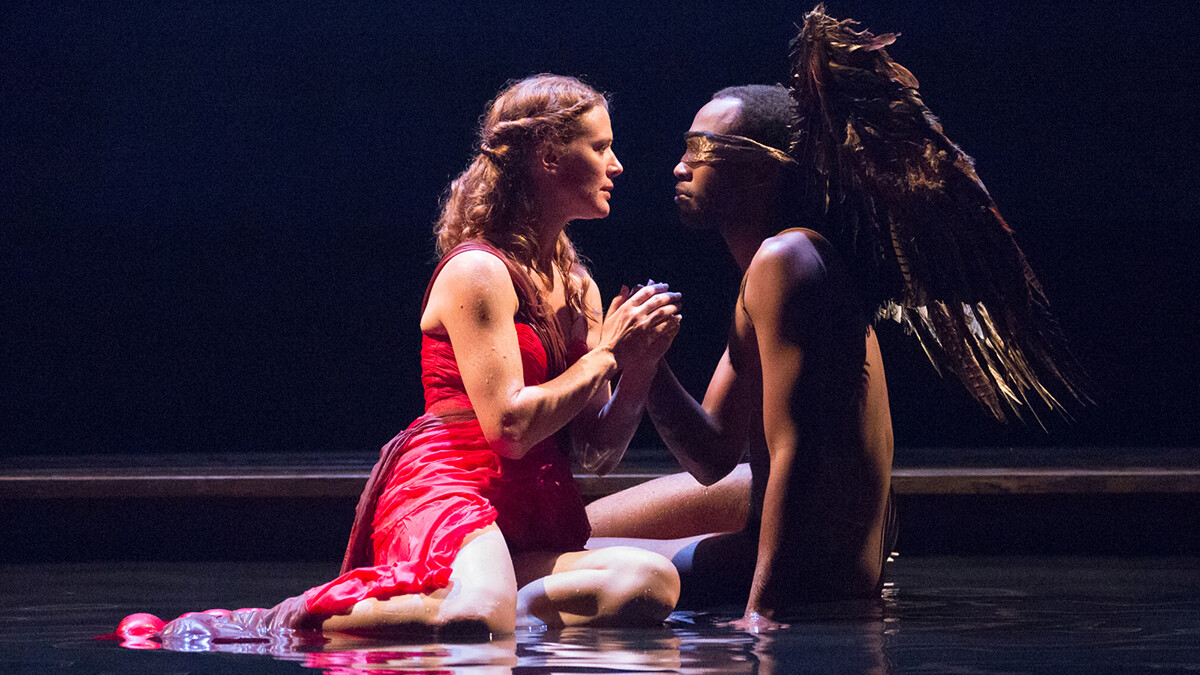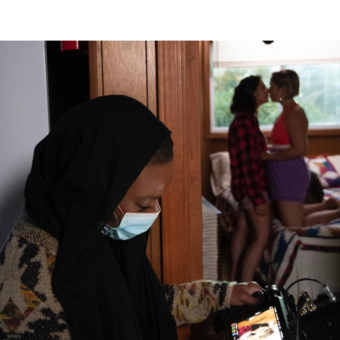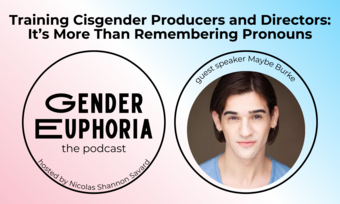In the spring of 2021, the final semester of my undergraduate acting program, we had a routine Q&A session with a prominent casting director in Los Angeles to prepare for our end-of-the-year showcase. I, an emerging intimacy director, asked him about his experience with intimacy in the industry and what he knew of the professional casting process when the role involved nudity. To my dismay, he began to explain what he referred to as “body checks” that were performed at callbacks. If the role required full nudity, the “body check” would involve an actor coming into the casting room wearing just a towel, standing in front of the casting team, dropping their towel, turning in a 360-degree circle, putting the towel back on, and then leaving the room.
In spite of the clear discomfort my classmates and I expressed upon hearing this answer, the casting director remained self-assured. He advised that if we were uncomfortable with nudity, we should avoid these roles altogether; however, he reassured us, in these “body check” auditions there would be no cameras in the room, a trained advocate would be on hand for the actor, and as few people would be present in the room as possible. To him, this was straightforward: It would be a “safe space.”
It is no secret that leaps and bounds have been made in the entertainment industry to keep actors safe thanks to the hard work of organizations such as Intimacy Directors and Coordinators, the #MeToo Movement, and Intimacy Directors International (now dissolved). However, my experience in college proves the work is far from over. While the casting director may have believed my concern about nudity in auditions stemmed from personal body insecurities, that was not accurate; instead, I was concerned by the motivations behind holding fully nude body checks for productions. In spite of safety precautions this or any other casting director might have in place, there is inherent damage caused by the requirement of nudity in the audition process.
The term “body check” itself implies that something about the actor’s nude body must be checked out or checked for.
As of a 2020 update to SAG-AFTRA, full nudity is no longer allowed in professional film auditions. Body checks completed in the audition process of a SAG-governed production may only take place at one final callback, and actors are provided modesty garments such as pasties, a G-string, or an “equivalent underwear or swimsuit.” This update is a significant step forward for SAG, yet it does not negate the necessity to examine why these rights must exist at all and, if they must, why prominent casting directors like the one that visited my class might not know about them. Why have other organizations and theatremakers not adopted these same principles to protect their actors if nudity must be required in an audition room?
The term “body check” itself implies that something about the actor’s nude body must be checked out or checked for. It is highly probable that many body checks are done due to fatphobic ideology and the desire to cast body types that can be hyper-sexualized. This practice thus has the potential to further perpetuate an unrealistic body standard.
These checks, even if conducted only at a final callback, solidify the idea that looks continue to take precedence over ability. While it may be difficult to eliminate all body checks (including those in which the actor is clothed to some degree) from auditions, fully nude auditions should be eliminated across all art forms to avoid basing final casting decisions on the appearance of an actor’s nipples and genitals. These areas on the body are heavily stigmatized, and almost any evaluation of their appearance on another’s body has the potential to lead to conversations that involve objectifying and transphobic language.
I can’t help but imagine what these conversations sound like behind the table after a fully nude body check. I imagine two women in final callbacks for a production that includes a topless scene. If they body checked their breasts, would the casting directors discuss the actors’ nipples or the placement of their breasts? Why wouldn’t a body check in a swimsuit be sufficient—if one is even needed? If the casting team has specific concerns about things such as scarring, tattoos, piercings, etc., questions regarding those concerns can all be asked on an audition sheet and not “checked” while the actor is nude at a final callback.
Or I imagine another scenario of a production needing to cast a male role involving full nudity. They decide on one actor over the other—but why? Did one have a larger penis? Or did the casting team just need to be sure there was a penis? It is because of these potentially damaging discussions that modesty garments need to be provided for actors if body checks are required in audition processes.
I have heard many theatremakers say body checks are not intended as an opportunity for the casting team to view an actor’s body before making a decision but instead to ensure the actor is truly comfortable with nudity before they make an offer. To that argument I say: Creative teams need to trust their actors and believe actors when they express their boundaries. I understand there will always be nudity and intimacy in art and I am not suggesting that should go away. But I believe its usage can be more thoughtful.











Comments
The article is just the start of the conversation—we want to know what you think about this subject, too! HowlRound is a space for knowledge-sharing, and we welcome spirited, thoughtful, and on-topic dialogue. Find our full comments policy here
I respectfully disagree.
As long as actors aren’t forced to do it against their will, I see no issue with full body checks. It’s no different than making sure the actors are right for the role in every other way, especially actors auditioning for a role they know will require them to be nude on stage in front of hundreds of people.
Body checks also confirm the actors are committed to the role and nudity and won’t back out on the day of the performance; something that happens often in film and television productions, which makes me feel body checks should be allowed for them as well.
With all due respect, this article seems to be yet another case of someone trying to change the industry to fit their personal preferences because they aren’t willing to follow the requirements of the industry.
Like your guest speaker said, if you’re uncomfortable with nudity — or body checks — you should avoid those roles and auditions altogether. There are hundreds of actors willing to do it, so let them and you stick to other plays.
What really comes across here is the incredibly objectifying and dehumanizing structure of professional auditions and the intense hierarchy of the casting process. This is not specifically related to nudity, as body and appearance checks are already happening when performers are fully clothed. There is so much politically at stake in who gets cast and how. Centering nudity in this way feels a bit like misdirection from the real issues of power at work.
Agreed, I also think there is a bigger issue at play. I see your reason for bringing up misdirection. I wrote about nudity in auditions because I felt it was a tangible thing in the casting process that can be regulated, a step to take in a better direction. I appreciate you continuing the conversation and think this needs to be discussed more for real progress to be made.
Oh heck no! I hope the casting director sees your article and learns from it! (Or retires) I'm so sorry that you had to go through that, but I'm glad you were able to write this thoughtful article.
Thank you for reading. Yes, I asked my professors to speak to them and make sure they know the rules have changed!